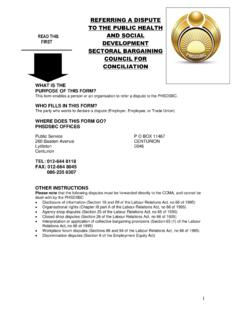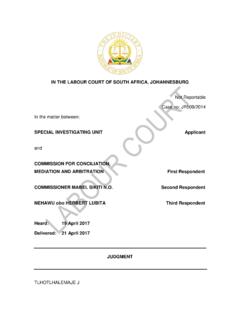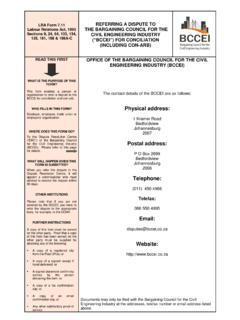Transcription of Extracts from the LRA - SAMWU
1 labour RELATIONS. ACT. 66 OF 1995 UPDATED 2005. ( Extracts ). CHAPTER 8: unfair . DISMISSAL AND unfair . labour PRACTICE. SCHEDULE 8: CODE OF. GOOD PRACTICE: DISMISSAL.. CONTENTS. CLAUSE PAGE NUMBER. CHAPTER VIII. 185. Right not to be unfairly dismissed 1. 186. Meaning of dismissal and unfair labour practice 1. 187. Automatically unfair dismissals 2. 188. Other unfair dismissals 3. 188A. Agreement for pre-dismissal arbitration 3. 189. Dismissals based on operational requirements 5. 189A. Dismissals based on operational requirements by 7. employers with more than 50 employees 190. Date of dismissal 11. 191. Disputes about unfair dismissals and unfair labour 12. practices 192. Onus in dismissal disputes 14. 193. Remedies for unfair dismissal and unfair labour 15. practice 194. Limits on Compensation 15. 195. Compensation is in addition to any other amount 16. 196. Severance pay 16. 197. Transfer of contract of employment 16. 197A. Transfer of contract of employment in 19.
2 Circumstances of insolvency 197B. Disclosure of information concerning insolvency 20. SCHEDULE 8: CODE OF GOOD PRACTICE: DISMISSAL. 1. Introduction 21. 2. Fair reason for dismissal 21. 3. Disciplinary measures short of dismissal 22. 4. Fair procedure 23. 5. Disciplinary record 23. 6. Dismissal and industrial action 23. 7. Guidelines in cases of dismissal for misconduct 24. 8. Probation 24. 9. Guidelines in cases of dismissal for poor work 26. performance 10. Incapacity: ill health or injury 26. 11. Guideline in cases of dismissal arising from ill health 27. or injury CHAPTER VIII : unfair DISMISSAL AND. unfair labour PRACTICE. 185. Right not to be unfairly dismissed or subjected to unfair labour practice Every employee has the right not to be- (a) unfairly dismissed; and (b) subjected to unfair labour practice. 186. Meaning of dismissal and unfair labour practice (1) "Dismissal" means that-- (a)an employer has terminated a contract of employment with or without notice.
3 (b)an employee reasonably expected the employer to renew a fixed term contract of employment on the same or similar terms but the employer offered to renew it on less favourable terms, or did not renew it;. (c)an employer refused to allow an employee to resume work after she-- (i) took maternity leave in terms of any law, collective agreement or her contract of employment. (d) an employer who dismissed a number of employees for the same or similar reasons has offered to re-employ one or more of them but has refused to re-employ another; or (e) an employee terminated a contract of employment with or without notice because the employer made continued employment intolerable for the employee. (f) an employee terminated a contract of employment with or without notice because the new employer, after a transfer in terms of section 197 or section 197A, provided the employee with conditions or circumstances at work that are substantially less favourable to the employee than those provided by the old employer.
4 (2) unfair labour practice means any unfair act or omission that arises between an employer and an employee involving- (a) unfair conduct by the employer relating to the promotion, demotion, probation (excluding disputes about dismissals for a reason relating to probation) or training of an employee or relating to the provision of benefits to an employee;. Extracts FROM labour RELATIONS ACT ON unfair DISMISSALS AND labour practices 1. (b) the unfair suspension of an employee or any other unfair disciplinary action short of dismissal in respect of an employee;. (c) a failure or refusal by an employer to reinstate or re-employ a former employee in terms of any agreement; and (d) an occupational detriment, other than dismissal, in contravention of the Protected Disclosures Act, 2000 (Act No. 26 of 2000), on account of the employee having made a protected disclosure defined in that Act. 187. Automatically unfair dismissals (1) A dismissal is automatically unfair if the employer, in dismissing the employee, acts contrary to section 51 or, if the reason for the dismissal is -- --- (a) that the employee participated in or supported, or indicated an intention to participate in or support, a strike or protest action that complies with the provisions of Chapter IV;2.
5 (b) that the employee refused, or indicated an intention to refuse, to do any work normally done by an employee who at the time was taking part in a strike that complies with the provisions of Chapter IV or was locked out, unless that work is necessary to prevent an actual danger to life, personal safety or health;. (c) to compel the employee to accept a demand in respect of any matter of mutual interest between the employer and employee;. (d) that the employee took action, or indicated an intention to take action, against the employer by ---- (i) exercising any right conferred by this Act; or (ii) participating in any proceedings in terms of this Act;. 1. Section 5 confers protections relating to the right to freedom of association and on members of workplace forums. 2. Chapter IV deals with industrial action and conduct in support of industrial action. Section 67(4) and (5) provide-- " (4) An employer may not dismiss an employee for participating in a protected strike or for any conduct in contemplation or in furtherance of a protected strike.
6 (5) Subsection (4) does not preclude an employer from fairly dismissing an employee in compliance with the provisions of Chapter VIII for a reason related to the employee's conduct during the strike, or for a reason based on the employer's operational requirements.". Section 77(3) provides- a Person who takes part in a protest action or in any conduct in contemplation or in furtherance of protest action that complies with subsection (1) enjoys the protections conferred by section 67 . Extracts FROM labour RELATIONS ACT ON unfair DISMISSALS AND labour practices 2. (e) the employee's pregnancy, intended pregnancy, or any reason related to her pregnancy;. (f) that the employer unfairly discriminated against an employee, directly or indirectly, on any arbitrary ground, including, but not limited to race, gender, sex, ethnic or social origin, colour, sexual orientation, age, disability, religion, conscience, belief, political opinion, culture, language, marital status or family responsibility.
7 (g) a transfer, or a reason related to a transfer, contemplated in section 197 or 197A; or (h) a contravention of the Protected Disclosures Act, 2000, by the employer, on account of an employee having made a protected disclosure defined in that Act. (2) Despite subsection ( l )(f)--- (a)a dismissal may be fair if the reason for dismissal is based on an inherent requirement of the particular job;. (b)a dismissal based on age is fair if the employee has reached the normal or agreed retirement age for persons employed in that capacity. 188. Other unfair dismissals (1)A dismissal that is not automatically unfair , is unfair if the employer fails to prove-- (a)that the reason for dismissal is a fair reason-- (i) related to the employee's conduct or capacity; or (ii) based on the employer's operational requirements; and (b)that the dismissal was effected in accordance with a fair procedure. (2) Any person considering whether or not the reason for dismissal is a fair reason or whether or not the dismissal was effected in accordance with a fair procedure must take into account any relevant code of good practice issued in term of this 188A.
8 Agreement for pre-dismissal arbitration (1) An employer may, with the consent of the employee, request a council, an accredited agency or the Commission to conduct an arbitration into allegations about the conduct or capacity of that employee. 3. See Schedule 8: the Code of Good Practice: Dismissal. Extracts FROM labour RELATIONS ACT ON unfair DISMISSALS AND labour practices 3. (2) The request must be in the prescribed form . (3) The council, accredited agency or the Commission must appoint an arbitrator on receipt of . (a) payment by the employer of the prescribed fee; and (b) the employee's written consent to the inquiry. (4) (a) An employee may only consent to a pre-dismissal arbitration after the employee has been advised of the allegation referred to in subsection (1). and in respect of a specific arbitration. (b)Despite subparagraph (a), an employee earning more than the amount determined by the Minister in terms of section 6 (3) of the Basic Conditions of Employment Act, may consent to the holding of a pre- dismissal arbitration in a contract of employment.
9 (5) In any arbitration in terms of this section a party to the dispute may appear in person or be represented only by . (a) a co-employee;. (b) a director or employee, if the party is a juristic person;. (c) any member, office bearer or official of that party's registered trade union or registered employers' organisation; or (d) a legal practitioner, on agreement between the parties. (6) Section 138, read with the changes required by the context, applies to any arbitration in terms of this section. (7) An arbitrator appointed in terms of this section has all the powers conferred on a commissioner by section 142 (1)(a) to (e), (2) and (7) to (9), read with the changes required by the context, and any reference in that section to the director for the purpose of this section, must be read as a reference to- (a) the secretary of the council, if the arbitration is held under the auspices of the council;. (b) the director of the accredited agency, if the arbitration is held under the auspices of an accredited agency.
10 (8) The provisions of sections 143 to 146 apply to any award made by an arbitrator in terms of this section. (9) An arbitrator conducting an arbitration in terms of this section must, in the light of the evidence presented and by reference to the criteria of fairness Extracts FROM labour RELATIONS ACT ON unfair DISMISSALS AND labour practices 4. in the Act, direct what action, if any, should be taken against the employee. (10) (a) A private agency may only conduct an arbitration in terms of this section if it is accredited for this purpose by the Commission. (b) A council may only conduct an arbitration in terms of this section in respect of which the employer or the employee is not a party to the council, if the council has been accredited for this purpose by the Commission. 189. Dismissals based on operational requirements (1)When an employer contemplates dismissing one or more employees for reasons based on the employer's operational requirements, the employer must consult-- (a) any person whom the employer is required to consult in terms of a collective agreement.





